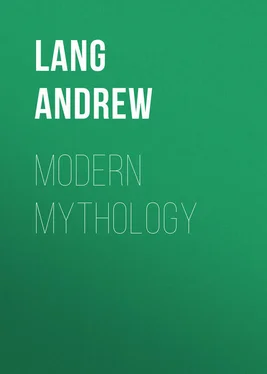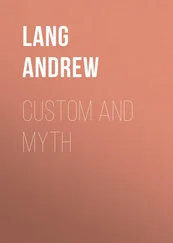Andrew Lang - Modern Mythology
Здесь есть возможность читать онлайн «Andrew Lang - Modern Mythology» — ознакомительный отрывок электронной книги совершенно бесплатно, а после прочтения отрывка купить полную версию. В некоторых случаях можно слушать аудио, скачать через торрент в формате fb2 и присутствует краткое содержание. Жанр: foreign_antique, foreign_prose, на английском языке. Описание произведения, (предисловие) а так же отзывы посетителей доступны на портале библиотеки ЛибКат.
- Название:Modern Mythology
- Автор:
- Жанр:
- Год:неизвестен
- ISBN:нет данных
- Рейтинг книги:4 / 5. Голосов: 1
-
Избранное:Добавить в избранное
- Отзывы:
-
Ваша оценка:
- 80
- 1
- 2
- 3
- 4
- 5
Modern Mythology: краткое содержание, описание и аннотация
Предлагаем к чтению аннотацию, описание, краткое содержание или предисловие (зависит от того, что написал сам автор книги «Modern Mythology»). Если вы не нашли необходимую информацию о книге — напишите в комментариях, мы постараемся отыскать её.
Modern Mythology — читать онлайн ознакомительный отрывок
Ниже представлен текст книги, разбитый по страницам. Система сохранения места последней прочитанной страницы, позволяет с удобством читать онлайн бесплатно книгу «Modern Mythology», без необходимости каждый раз заново искать на чём Вы остановились. Поставьте закладку, и сможете в любой момент перейти на страницу, на которой закончили чтение.
Интервал:
Закладка:
My theory of the origin of that belief is, of course, a mere guess; we have never seen any race in the process of passing from a total lack of a hypothesis of causes into that hypothesis of universally distributed personality which is the basis of mythology.
But Mr. Max Müller conceives that this belief in universally distributed personality (the word ‘Animism’ is not very clear) was the result of an historical necessity – not of speculation, but of language. ‘Roots were all, or nearly all, expressive of action… Hence a river could only be called or conceived as a runner, or a roarer, or a defender; and in all these capacities always as something active and animated, nay, as something masculine or feminine.’
But why conceived as ‘masculine or feminine’? This necessity for endowing inanimate though active things, such as rivers, with sex, is obviously a necessity of a stage of thought wholly unlike our own. We know that active inanimate things are sexless, are neuter; we feel no necessity to speak of them as male or female. How did the first speakers of the human race come to be obliged to call lifeless things by names connoting sex, and therefore connoting, not only activity, but also life and personality? We explain it by the theory that man called lifeless things male or female – by using gender-terminations – as a result of his habit of regarding lifeless things as personal beings; that habit, again, being the result of his consciousness of himself as a living will.
Mr. Max Müller takes the opposite view. Man did not call lifeless things by names denoting sex because he regarded them as persons; he came to regard them as persons because he had already given them names connoting sex. And why had he done that? This is what Mr. Max Müller does not explain. He says:
‘In ancient languages every one of these words’ (sky, earth, sea, rain) ‘had necessarily’ (why necessarily?) ‘a termination expressive of gender, and this naturally produced in the mind the corresponding idea of sex, so that these names received not only an individual but a sexual character.’ 1 1 Chips , iv. 62.
It is curious that, in proof apparently of this, Mr. Max Müller cites a passage from the Printer’s Register , in which we read that to little children ‘ everything is alive … The same instinct that prompts the child to personify everything remains unchecked in the savage, and grows up with him to manhood. Hence in all simple and early languages there are but two genders, masculine and feminine.’
The Printer’s Register states our theory in its own words. First came the childlike and savage belief in universal personality. Thence arose the genders, masculine and feminine, in early languages. These ideas are the precise reverse of Mr. Max Müller’s ideas. In his opinion, genders in language caused the belief in the universal personality even of inanimate things. The Printer’s Register holds that the belief in universal personality, on the other hand, caused the genders. Yet for thirty years, since 1868, Mr. Max Müller has been citing his direct adversary, in the Printer’s Register , as a supporter of his opinion! We, then, hold that man thought all things animated, and expressed his belief in gender-terminations. Mr. Max Müller holds that, because man used gender-terminations, therefore he thought all things animated, and so he became mythopœic. In the passage cited, Mr. Max Müller does not say why ‘in ancient languages every one of these words had necessarily terminations expressive of gender.’ He merely quotes the hypothesis of the Printer’s Register . If he accepts that hypothesis, it destroys his own theory – that gender-terminations caused all things to be regarded as personal; for, ex hypothesi , it was just because they were regarded as personal that they received names with gender-terminations. Somewhere – I cannot find the reference – Mr. Max Müller seems to admit that personalising thought caused gender-terminations, but these later ‘reacted’ on thought, an hypothesis which multiplies causes præter necessitatem .
Here, then, at the very threshold of the science of mythology we find Mr. Max Müller at once maintaining that a feature of language, gender-terminations, caused the mythopœic state of thought, and quoting with approval the statement that the mythopœic state of thought caused gender-terminations.
Mr. Max Müller’s whole system of mythology is based on reasoning analogous to this example. His mot d’ordre , as Professor Tiele says, is ‘a disease of language.’ This theory implies universal human degradation. Man was once, for all we know, rational enough; but his mysterious habit of using gender-terminations, and his perpetual misconceptions of the meaning of old words in his own language, reduced him to the irrational and often (as we now say) obscene and revolting absurdities of his myths. Here (as is later pointed out) the objection arises, that all languages must have taken the disease in the same way. A Maori myth is very like a Greek myth. If the Greek myth arose from a disease of Greek, how did the wholly different Maori speech, and a score of others, come to have precisely the same malady?
Mr. Max Müller alludes to a Maori parallel to the myth of Cronos. 2 2 Chips , iv. p. xxxv.
‘We can only say that there is a rusty lock in New Zealand, and a rusty lock in Greece, and that, surely, is very small comfort.’ He does not take the point. The point is that, as the myth occurs in two remote and absolutely unconnected languages, a theory of disease of language cannot turn the wards of the rusty locks. The myth is, in part at least, a nature-myth – an attempt to account for the severance of Heaven and Earth (once united) by telling a story in which natural phenomena are animated and personal. A disease of language has nothing to do with this myth. It is cited as a proof against the theory of disease of language.
The truth is, that while languages differ, men (and above all early men) have the same kind of thoughts, desires, fancies, habits, institutions. It is not that in which all races formally differ – their language – but that in which all early races are astonishingly the same – their ideas, fancies, habits, desires – that causes the amazing similarity of their myths.
Mythologists, then, who find in early human nature the living ideas which express themselves in myths will hardily venture to compare the analogous myths of all peoples. Mythologists, on the other hand, who find the origin of myths in a necessity imposed upon thought by misunderstood language will necessarily, and logically, compare only myths current among races who speak languages of the same family. Thus, throughout Mr. Max Müller’s new book we constantly find him protesting, on the whole and as a rule, against the system which illustrates Aryan myths by savage parallels. Thus he maintains that it is perilous to make comparative use of myths current in languages – say, Maori or Samoyed – which the mythologists confessedly do not know. To this we can only reply that we use the works of the best accessible authorities, men who do know the languages – say, Dr. Codrington or Bishop Callaway, or Castren or Egede. Now it is not maintained that the myths, on the whole, are incorrectly translated. The danger which we incur, it seems, is ignorance of the original sense of savage or barbaric divine or heroic names – say, Maui, or Yehl, or Huitzilopochhtli, or Heitsi Eibib, or Pundjel. By Mr. Max Müller’s system such names are old words, of meanings long ago generally lost by the speakers of each language, but analysable by ‘true scholars’ into their original significance. That will usually be found by the philologists to indicate ‘the inevitable Dawn,’ or Sun, or Night, or the like, according to the taste and fancy of the student.
Читать дальшеИнтервал:
Закладка:
Похожие книги на «Modern Mythology»
Представляем Вашему вниманию похожие книги на «Modern Mythology» списком для выбора. Мы отобрали схожую по названию и смыслу литературу в надежде предоставить читателям больше вариантов отыскать новые, интересные, ещё непрочитанные произведения.
Обсуждение, отзывы о книге «Modern Mythology» и просто собственные мнения читателей. Оставьте ваши комментарии, напишите, что Вы думаете о произведении, его смысле или главных героях. Укажите что конкретно понравилось, а что нет, и почему Вы так считаете.












